In this article, I am going to tell you 10+ Best Website Builder Reddit According. So if you want to know about it, then keep reading this article. Because I am going to give you complete information about it, so let’s start.
A website builder is a software or online platform that allows individuals and businesses to create websites without needing to have in-depth knowledge of coding or web development. Website builders provide a user-friendly interface that typically employs drag-and-drop tools, pre-designed templates, and various customization options to simplify the process of building a website.

Today’s article focuses on the same, i.e. “10+ Best Website Builder Reddit According” The articles entail each bit of information necessary for you to know.
Let’s get started!✨
Table of Contents
What is Website Builder?
A website builder is a tool or platform that allows people to create websites without needing coding skills. It provides an easy-to-use interface with drag-and-drop tools and templates for designing web pages. Users can customize the design, add content like text and images, and then preview the site before publishing it.
Website builders are commonly used by individuals and small businesses to quickly create websites, and they’re a cost-effective alternative to hiring professional web developers. There are different website builders available, catering to various needs such as blogs, e-commerce, portfolios, and more.
Here’s how a website builder generally works:
- Choose a Template: Users start by selecting a template that suits their website’s purpose and design preferences. Templates are pre-designed layouts that determine the overall structure and visual appearance of the site.
- Customization: Once a template is chosen, users can customize various elements such as text, images, colors, fonts, and more. This allows for personalization and branding of the website.
- Content Creation: Users can add pages, sections, and content to their website using drag-and-drop tools. Content can include text, images, videos, forms, buttons, and other elements.
- Preview and Edit: Most website builders provide a preview mode that allows users to see how their site looks and functions before publishing. Users can make further edits and adjustments as needed.
- Domain and Hosting: Some website builders offer domain registration and hosting services, making it convenient to manage all aspects of the website in one place. Others might require users to connect their own domain or hosting.
- Publish: Once satisfied with the design and content, users can publish their website to make it accessible to the public on the internet.
Website builders are commonly used by individuals, small businesses, entrepreneurs, artists, and anyone who wants to create a professional-looking website without the need for extensive coding skills. They offer a cost-effective and time-efficient way to establish an online presence. However, for more complex or specialized websites, hiring a professional web developer might still be necessary to achieve specific functionalities or design elements.
There are various website builders available, each with its own features, pricing models, and templates. It’s important to choose a website builder that aligns with your needs and goals, whether you’re creating a personal blog, an e-commerce store, a portfolio, or a business website.
10+ Best Website Builder Reddit According
Here is a list of some popular 10+ best website builders according to Reddit. Which are highly appreciated for creating different types of websites.
1. Wix

Wix is a popular website builder known for its user-friendly interface and versatility. It’s often chosen by individuals, small businesses, and creative professionals who want to create visually appealing and functional websites without needing advanced technical skills.
Here are some key features and benefits of Wix:
- Drag-and-Drop Interface: Wix’s drag-and-drop editor makes it easy to build and customize your website without needing to know how to code. You can arrange elements like text, images, videos, and more by simply dragging and dropping them onto the page.
- Templates: Wix offers a wide variety of professionally designed templates that cater to different industries and styles. These templates are customizable, allowing you to create a unique look for your website.
- App Market: Wix has an App Market that offers a range of third-party applications to enhance your website’s functionality. You can add features like forms, live chat, e-commerce tools, booking systems, and more.
- E-Commerce: Wix provides e-commerce capabilities, allowing you to set up an online store to sell products and services. You can manage inventory, process payments, and customize the shopping experience.
- Mobile Optimization: All Wix templates are mobile-responsive, meaning your website will automatically adjust to different screen sizes, ensuring a good user experience on smartphones and tablets.
- Wix ADI: Wix offers an Artificial Design Intelligence (ADI) feature that guides you through the website creation process based on your answers to a few questions. It’s a good option if you’re unsure about design choices.
- Blog Functionality: If you’re interested in blogging, Wix provides tools to create and manage blog posts. You can categorize posts, add images, and integrate social sharing buttons.
- SEO Tools: Wix offers basic SEO features, allowing you to optimize your site’s meta tags, headings, and more. However, it’s worth noting that some advanced SEO techniques might be limited compared to other platforms.
- Free Plan: Wix offers a free plan with limited features and Wix branding. This can be a good starting point for experimenting with the platform before committing to a paid plan.
- Premium Plans: Wix offers a range of paid plans with varying features and capabilities, including options for personal websites, businesses, and e-commerce stores. These plans also provide you with a custom domain and the ability to remove Wix ads.
- Customer Support: Wix offers customer support through its Help Center, tutorials, and a community forum. Premium plans include priority support.
Overall, Wix is a versatile and user-friendly website builder that’s suitable for a wide range of purposes. It’s especially popular for individuals and small businesses looking to create visually appealing websites with relative ease. Keep in mind that while Wix is a great choice for many, it’s always a good idea to assess your specific needs and preferences before making a decision.
2. Squarespace

Squarespace is another well-known website builder that is particularly recognized for its emphasis on design and aesthetics. It’s a popular choice for creative professionals, artists, photographers, and businesses that want to showcase their work with visually stunning websites.
Here are some key features and benefits of Squarespace:
- Design and Templates: Squarespace offers a collection of beautifully designed templates that are suitable for various purposes, including portfolios, blogs, e-commerce stores, and business websites. The templates are modern and responsive, ensuring that your site looks great on different devices.
- Visual Editor: The Squarespace interface is based on a visual drag-and-drop editor that allows you to customize the layout and design of your website. It’s intuitive and user-friendly, making it accessible to both beginners and those with design experience.
- Customization: While the templates provide a starting point, Squarespace allows for extensive customization. You can adjust colors, fonts, spacing, and more to match your brand’s identity.
- E-Commerce: Squarespace offers e-commerce capabilities, making it possible to create online stores. You can showcase products, manage inventory, process payments, and provide a seamless shopping experience for customers.
- Content Management: The platform provides tools for creating and managing content, whether you’re writing blog posts, adding images, or embedding multimedia elements.
- Integrated Features: Squarespace includes a range of built-in features like galleries, forms, social media integration, analytics, and SEO tools. This reduces the need to rely on third-party plugins.
- Mobile Optimization: All Squarespace templates are responsive, ensuring that your website looks and functions well on various devices, including smartphones and tablets.
- Blogging: Squarespace offers robust blogging features, allowing you to create and organize blog posts with ease. You can categorize posts, add tags, and enable social sharing.
- Integration with External Tools: While Squarespace aims to provide an all-in-one platform, it also supports integrations with external tools like Mailchimp, Google Workspace, and social media platforms.
- Customer Support: Squarespace provides customer support through various channels, including email, live chat, and a comprehensive knowledge base.
- Free Trial: Squarespace offers a free trial period that allows you to explore the platform and build your website before committing to a subscription.
- Subscription Plans: Squarespace offers different pricing tiers with varying features, including personal websites, business websites, and e-commerce stores. Paid plans provide you with a custom domain and the ability to remove Squarespace branding.
Squarespace is an excellent choice for individuals and businesses that prioritize design and want to create visually appealing websites without diving into complex coding. However, as with any platform, it’s important to assess your specific needs and preferences to determine if Squarespace aligns with your goals.
3. WordPress

WordPress is one of the most versatile and widely used content management systems (CMS) and website-building platforms. It’s known for its flexibility, customization options, and extensive community support. There are two main versions of WordPress: WordPress.com (hosted) and WordPress.org (self-hosted). Here’s an overview of both options:
WordPress.com (Hosted):
- Ease of Use: WordPress.com offers a user-friendly interface that’s suitable for beginners. You can choose from a variety of themes and customize your site using a visual editor.
- Managed Hosting: WordPress.com takes care of hosting, security, updates, and backups for you. This can be a great option if you want a hassle-free experience.
- Free Plan: There’s a free plan available, but it comes with limitations such as ads, a WordPress.com subdomain (e.g., yoursite.wordpress.com), and limited customization options.
- Paid Plans: WordPress.com offers various paid plans with more features, including custom domain names, advanced customization, e-commerce capabilities, and better support.
- eCommerce: The higher-tier plans of WordPress.com include e-commerce capabilities powered by WooCommerce, allowing you to set up an online store.
- Customization: While customization is available, it’s more limited compared to self-hosted WordPress. You can’t install third-party plugins or custom themes on lower-tier plans.
WordPress.org (Self-Hosted):
- Full Control: With self-hosted WordPress, you have complete control over your website. You can install custom themes, plugins, and code modifications.
- Flexibility: Self-hosted WordPress is incredibly flexible, making it suitable for various types of websites, from blogs to e-commerce stores and beyond.
- Themes and Plugins: There are thousands of free and premium themes and plugins available, allowing you to extend the functionality and appearance of your site.
- eCommerce: You can use plugins like WooCommerce to set up powerful online stores with features like product management, payments, and shipping options.
- Custom Domain: You’ll need to purchase a domain name and hosting separately. This gives you a unique web address (e.g., yoursite.com).
- Learning Curve: While there’s a steeper learning curve compared to hosted solutions, the extensive online community and resources can help you navigate it.
- Security and Maintenance: Since you’re responsible for hosting, security, backups, and updates, it’s essential to keep your site secure and up to date.
Overall, WordPress is an excellent choice if you value flexibility, customization, and scalability. Self-hosted WordPress offers more control, but it requires more technical know-how, whereas WordPress.com is easier to get started with, but offers less customization on lower-tier plans. Assess your technical abilities, website goals, and level of control needed before choosing between the hosted and self-hosted options.
4. Weebly
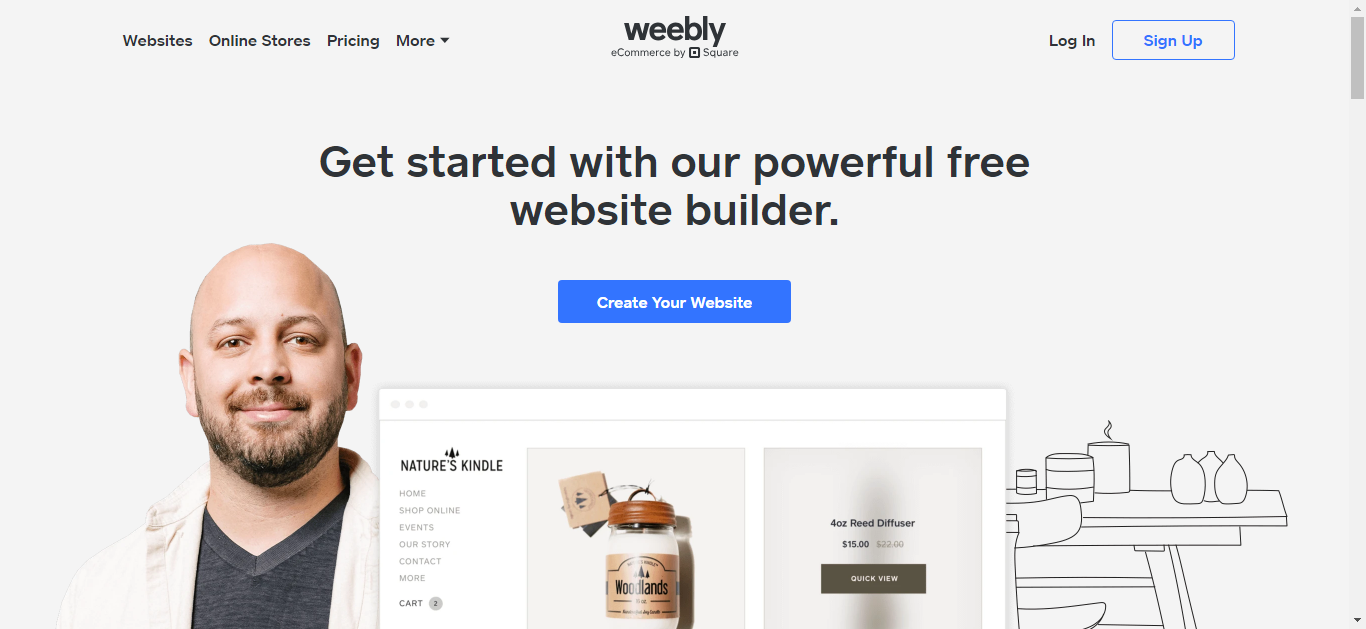
Weebly is a website builder that is known for its user-friendly interface and simplicity. It’s a popular choice for individuals and small businesses looking to create basic websites without the need for advanced technical skills.
Here are some key features and benefits of Weebly:
- Drag-and-Drop Editor: Weebly’s drag-and-drop editor makes it easy to create and customize your website. You can add various elements like text, images, videos, contact forms, and more by simply dragging them onto the page.
- Templates: Weebly offers a range of professionally designed templates that cover different industries and styles. These templates are responsive, ensuring that your website looks good on various devices.
- Mobile Optimization: All Weebly templates are optimized for mobile devices, providing a good user experience on smartphones and tablets.
- eCommerce: Weebly has built-in e-commerce capabilities that allow you to create online stores and sell products or services. You can manage inventory, process payments, and set up shipping options.
- App Center: Weebly has an App Center where you can find and integrate various third-party applications and widgets to add functionality to your website, such as social media feeds, contact forms, and more.
- Blogging: Weebly includes blogging features, allowing you to create and manage blog posts. You can categorize posts, add tags, and enable social sharing.
- Customization: While Weebly’s customization options may not be as extensive as some other platforms, you can still adjust colors, fonts, and layout to suit your brand.
- SEO Tools: Weebly provides basic SEO tools that allow you to optimize your site’s meta tags, descriptions, and headers for search engines.
- Domain and Hosting: Weebly provides both domain registration and hosting, simplifying the process of setting up your website.
- Support: Weebly offers customer support through email and live chat. There’s also a knowledge base and community forum for troubleshooting and guidance.
- Free Plan: Weebly offers a free plan with basic features, but it includes Weebly branding and a subdomain (e.g., yoursite.weebly.com). This can be a good starting point for testing the platform.
- Premium Plans: Weebly offers various premium plans that provide more features, including the ability to use your custom domain, remove Weebly branding, and access advanced tools.
Weebly is best suited for individuals, small businesses, and organizations that need a simple and straightforward website solution. If you’re looking for a platform with a low learning curve and you don’t require complex features or extensive customization, Weebly could be a good choice. However, if you have more advanced needs or you’re planning to expand your website significantly, you might want to explore other options with more robust capabilities.
5. Shopify

Shopify is a specialized e-commerce platform designed specifically for creating and managing online stores. It’s a comprehensive solution that offers a wide range of features to help individuals and businesses sell products and services online.
Here’s an overview of Shopify’s key features and benefits:
- E-Commerce Focus: Shopify is built from the ground up for e-commerce. It provides tools and features tailored to creating and running online stores.
- Store Setup: Shopify makes it relatively easy to set up an online store without requiring extensive technical skills. You can choose from a variety of customizable templates.
- Product Management: You can easily add and manage products, organize them into categories, set prices, and control inventory levels.
- Payment Processing: Shopify supports multiple payment gateways, allowing you to accept credit card payments, PayPal, and other popular payment methods.
- Security: Security is a priority for Shopify. The platform provides SSL certificates and secure hosting to protect customer data and transactions.
- Mobile Responsiveness: Shopify themes are designed to be mobile-responsive, ensuring a seamless shopping experience on various devices.
- App Store: Shopify offers an extensive App Store where you can find and integrate various apps to enhance your store’s functionality. These apps cover areas such as marketing, customer service, analytics, and more.
- Built-in Blog: Shopify includes a blogging platform that allows you to publish and manage content. This can help you connect with customers, improve SEO, and share valuable information.
- SEO Tools: Shopify provides tools to optimize your store for search engines. You can edit meta tags, titles, and descriptions for products and pages.
- Analytics: Shopify offers built-in analytics and reporting tools that allow you to track sales, customer behavior, and other important metrics.
- Order Management: You can manage orders, process refunds, print shipping labels, and communicate with customers directly from the Shopify dashboard.
- Shipping and Taxes: Shopify offers shipping rate calculators and tax calculation features to help you handle shipping costs and tax regulations.
- 24/7 Customer Support: Shopify provides customer support through live chat, email, phone, and a help center. Their support is available 24/7.
- Multiple Sales Channels: In addition to your online store, you can also sell on social media platforms, marketplaces, and in-person using Shopify’s Point of Sale (POS) system.
- Themes and Customization: Shopify offers a variety of themes that you can customize to match your brand’s identity. You can also use HTML, CSS, and Liquid (Shopify’s templating language) or a page builder app for advanced customization.
- Pricing: Shopify offers different pricing plans to accommodate various business sizes and needs, including a 14-day free trial to get started.
Shopify is an excellent choice if you’re primarily focused on building and growing an online store. It provides a robust set of features, a user-friendly interface, and extensive integrations to help you manage your e-commerce business effectively. If you’re looking to sell products online, Shopify is one of the leading options available.
6. BigCommerce

BigCommerce is another e-commerce platform that’s designed to help businesses create and manage online stores. Similar to Shopify, it offers a range of features tailored specifically for e-commerce needs.
Here’s an overview of BigCommerce’s key features and benefits:
- E-Commerce Focus: BigCommerce is built for e-commerce, offering features that support online selling, inventory management, and customer interactions.
- Store Setup: BigCommerce provides a user-friendly interface that makes it relatively easy to set up and customize an online store. You can choose from a selection of templates.
- Product Management: You can manage products, categorize them, set prices, and handle inventory levels using BigCommerce’s tools.
- Payment Processing: BigCommerce supports various payment gateways, allowing you to accept credit cards, PayPal, and other popular payment methods.
- Mobile Responsiveness: The platform’s templates are mobile-responsive, ensuring a smooth shopping experience across different devices.
- App Integrations: BigCommerce offers an app marketplace where you can find and integrate various apps to extend your store’s functionality. These apps cover areas like marketing, analytics, customer service, and more.
- Security: BigCommerce places a strong emphasis on security, providing SSL certificates and secure hosting to protect customer data and transactions.
- Customization: You can customize your store’s appearance using themes, and you have access to HTML, CSS, and the Stencil framework for advanced customization.
- SEO Tools: BigCommerce includes SEO tools to optimize your store’s visibility in search engine results. You can edit meta tags, titles, and descriptions for products and pages.
- Analytics and Reporting: BigCommerce offers built-in analytics and reporting features to track sales, customer behavior, and other essential metrics.
- Shipping and Taxes: You can set up shipping options and calculate shipping costs based on various criteria. BigCommerce also offers tax calculation features.
- Order Management: BigCommerce provides tools to manage orders, process returns, print shipping labels, and communicate with customers.
- Customer Support: The platform offers customer support through various channels, including live chat, email, and phone. There’s also a knowledge base and community forum.
- Multi-Channel Selling: In addition to your online store, you can sell on other platforms such as Amazon, eBay, Facebook, and Google Shopping using BigCommerce’s integrations.
- Pricing: BigCommerce offers different pricing plans, including a 15-day free trial. Plans are designed to accommodate businesses of various sizes and needs.
BigCommerce is a solid choice for businesses that want to focus on building a robust online store with e-commerce-specific features. It offers a range of tools to help you manage your products, orders, and customer interactions effectively. When deciding between e-commerce platforms like BigCommerce and Shopify, it’s a good idea to consider your specific requirements, budget, and the unique features each platform offers.
7. WooCommerce

WooCommerce is a powerful e-commerce plugin for WordPress, the widely used content management system (CMS). It’s an excellent choice if you’re looking to add e-commerce functionality to your existing WordPress website.
Here’s an overview of WooCommerce’s key features and benefits:
- WordPress Integration: WooCommerce seamlessly integrates with WordPress, allowing you to transform your WordPress website into a fully functional online store.
- Customization: Since WooCommerce is built on WordPress, you have extensive control over your store’s appearance and functionality. You can customize themes, add plugins, and use code modifications to create a unique e-commerce experience.
- Product Management: WooCommerce provides tools to add, edit, and manage products. You can set prices, manage inventory, and organize products into categories and tags.
- Payment Processing: WooCommerce supports various payment gateways, enabling you to accept credit cards, PayPal, and other payment methods.
- Extensions and Plugins: WooCommerce has a vast ecosystem of plugins and extensions that allow you to add features such as advanced shipping options, payment gateways, product variations, subscriptions, and more.
- Themes: You can choose from a variety of WooCommerce-compatible themes to customize your store’s design. Some themes are designed specifically for e-commerce.
- Mobile Responsiveness: WooCommerce themes are designed to be mobile-responsive, providing a seamless shopping experience on smartphones and tablets.
- SEO Tools: Since you’re using WordPress, you can take advantage of SEO plugins like Yoast SEO to optimize your store for search engines.
- Analytics and Reporting: WooCommerce provides basic reporting features, and you can integrate with Google Analytics to gain insights into your store’s performance.
- Product Variations: You can create products with different variations such as sizes, colors, and styles. This is particularly useful for stores selling customizable or varied products.
- Shipping and Taxes: WooCommerce offers built-in shipping options, and you can set up tax calculations based on location and product type.
- Community and Support: Since WooCommerce is part of the WordPress ecosystem, you’ll have access to a large community of users and developers who can provide support and guidance.
- Flexibility: WooCommerce is suitable for various types of businesses, from small boutiques to larger online stores. You can scale your store as your business grows.
- Pricing: WooCommerce itself is free to use. However, you’ll need to budget for web hosting, domain registration, and potentially premium themes and plugins.
WooCommerce is a great choice if you already have a WordPress website and want to expand into e-commerce. It offers the flexibility of WordPress along with powerful e-commerce features, making it suitable for both small and large businesses. Keep in mind that while WooCommerce gives you more control over your store’s design and functionality, it also requires a higher level of technical knowledge compared to hosted e-commerce platforms.
8. Webflow
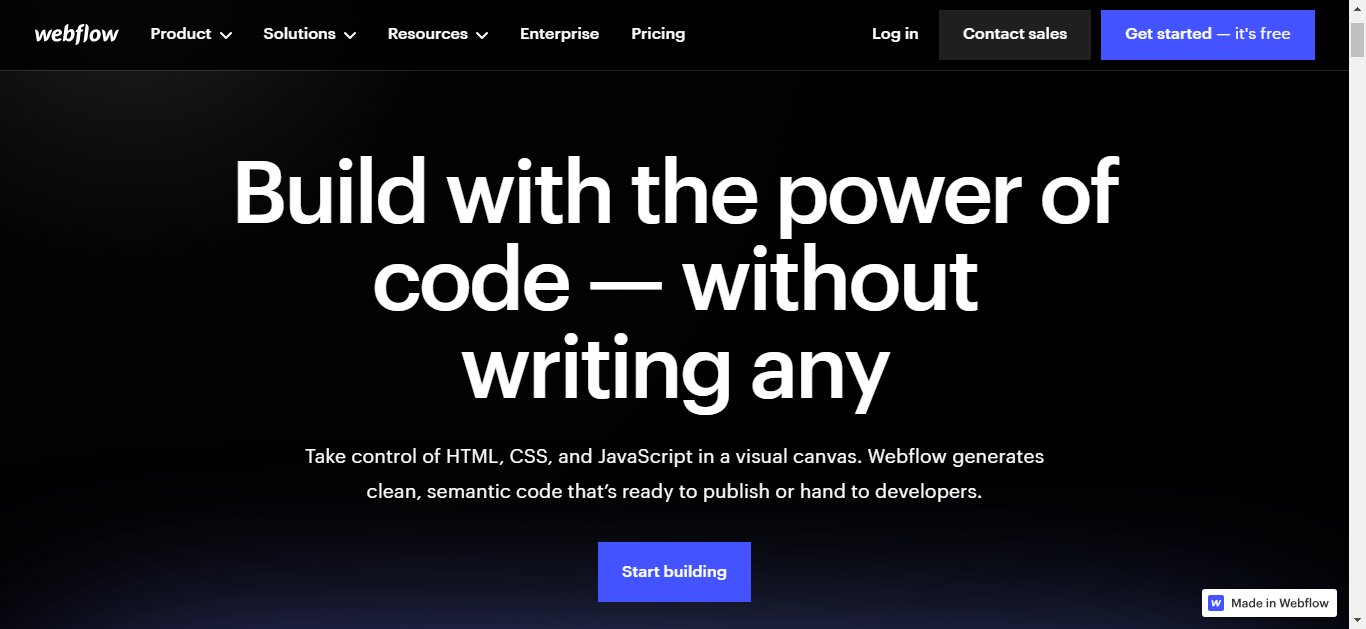
Webflow is a website builder that combines visual design capabilities with the ability to create custom code, making it suitable for designers, developers, and individuals who want more control over the design and functionality of their websites.
Here’s an overview of Webflow’s key features and benefits:
- Design Flexibility: Webflow offers a visual drag-and-drop interface that allows you to design websites visually. You can also dive into custom code using the built-in code editor for more advanced customization.
- Responsive Design: All Webflow designs are responsive by default, ensuring that your website looks and functions well on various screen sizes and devices.
- Custom Code: Webflow allows you to integrate your own HTML, CSS, and JavaScript code. This makes it possible to create highly customized and unique websites.
- Interactions and Animations: You can create dynamic interactions and animations using Webflow’s interactions panel, enhancing the user experience of your website.
- CMS Capabilities: Webflow provides a content management system (CMS) that allows you to create and manage dynamic content such as blog posts, products, and more.
- E-Commerce: Webflow offers e-commerce capabilities, making it possible to set up and manage online stores. It supports product listings, shopping carts, and checkout processes.
- Hosting: Webflow provides web hosting, eliminating the need for third-party hosting services. This simplifies the process of launching and managing your website.
- Templates and UI Kits: Webflow offers a variety of templates and UI kits that can serve as starting points for your designs. You can customize these templates to match your brand.
- SEO Tools: Webflow provides tools to optimize your website for search engines, including the ability to edit meta tags, descriptions, and headings.
- Collaboration: Webflow offers collaboration features that allow teams to work together on projects, making it suitable for design agencies and teams.
- Code Export: If you prefer, you can export your Webflow design as clean HTML, CSS, and JavaScript code, giving you the freedom to host your site elsewhere.
- Easier Learning Curve for Designers: Webflow’s visual interface can make it easier for designers to transition into creating functional websites without delving into complex coding.
- Pricing: Webflow offers different pricing plans, including plans for individuals, teams, and e-commerce. There’s also a free plan with limitations.
Webflow is an excellent choice if you want to combine visual design with the ability to customize code. It’s particularly well-suited for designers who want more control over their designs and developers who want a tool that bridges the gap between design and code. Keep in mind that Webflow may have a steeper learning curve compared to more traditional website builders, especially if you’re new to web design and development concepts.
9. Jimdo
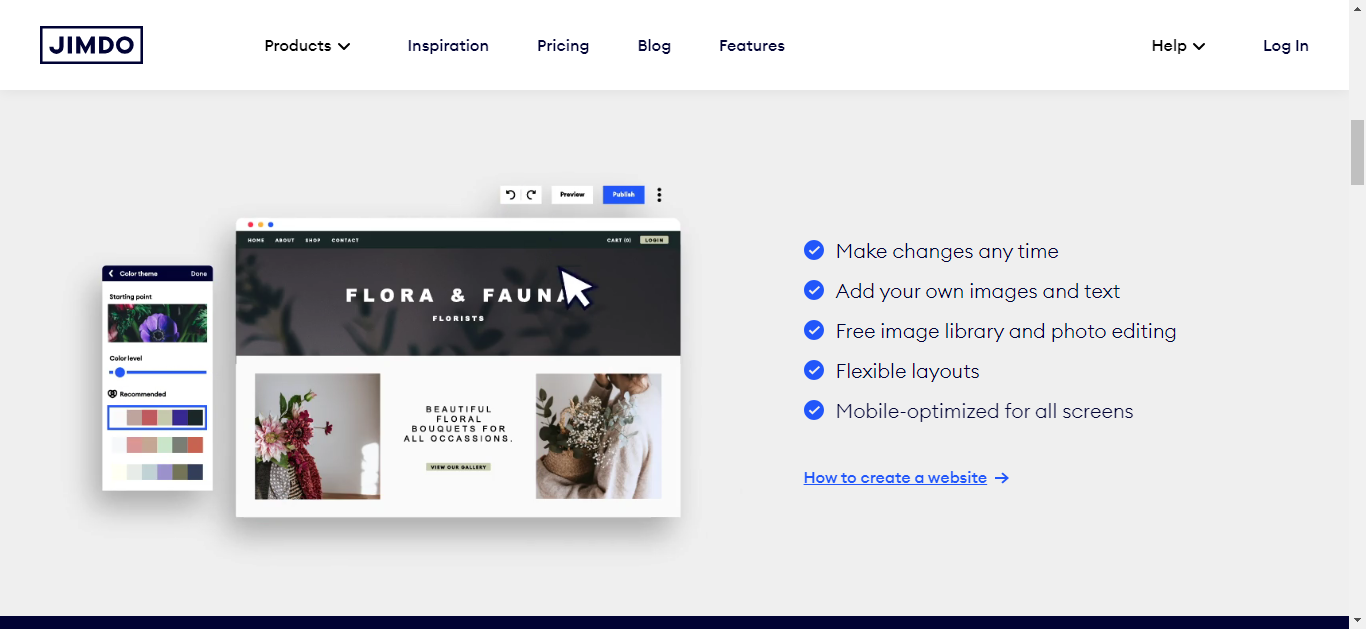
Jimdo is a website builder that offers a simplified and user-friendly platform for creating websites, particularly suited for individuals, small businesses, and entrepreneurs who want to establish an online presence quickly and easily.
Here’s an overview of Jimdo’s key features and benefits:
- Simplicity: Jimdo is designed with ease of use in mind. It provides a straightforward interface that guides you through the process of creating a website without requiring technical skills.
- Website Creation: With Jimdo, you can create websites using a drag-and-drop editor. You can add elements like text, images, videos, contact forms, and more by simply dragging them onto the page.
- Templates: Jimdo offers a range of templates that cater to different industries and styles. These templates are designed to be mobile-responsive, ensuring a good experience on various devices.
- Mobile Optimization: All Jimdo templates are optimized for mobile devices, ensuring that your website looks and functions well on smartphones and tablets.
- E-Commerce: Jimdo provides e-commerce capabilities, allowing you to set up online stores and sell products or services. You can manage products, process payments, and handle orders.
- Customization: While Jimdo’s customization options might be more limited compared to some other platforms, you can still adjust colors, fonts, and layout to reflect your brand.
- SEO Tools: Jimdo offers basic SEO tools to help optimize your website for search engines. You can edit meta tags, titles, and descriptions for better search visibility.
- Blogging: Jimdo includes blogging features that allow you to create and manage blog posts. You can categorize posts, add images, and enable social sharing.
- Support: Jimdo offers customer support through email and a knowledge base. Support availability might vary based on your subscription plan.
- Free Plan: Jimdo offers a free plan with basic features, but it includes Jimdo branding and a subdomain (e.g., yoursite.jimdosite.com). It’s a good starting point for experimenting.
- Paid Plans: Jimdo offers different paid plans with more features, including the ability to use your custom domain, remove Jimdo branding, and access advanced tools.
- Jimdo Dolphin: Jimdo offers a feature called “Dolphin” that uses artificial intelligence to create a basic website for you based on answers to a few questions.
Jimdo is a suitable choice if you’re looking for a straightforward and streamlined website builder that doesn’t require extensive technical knowledge. It’s particularly well-suited for individuals and small businesses that need a simple online presence and basic e-commerce capabilities. However, if you anticipate needing more advanced features, customization options, or scalability in the future, you might want to explore other platforms with greater flexibility.
10. GoDaddy Website Builder
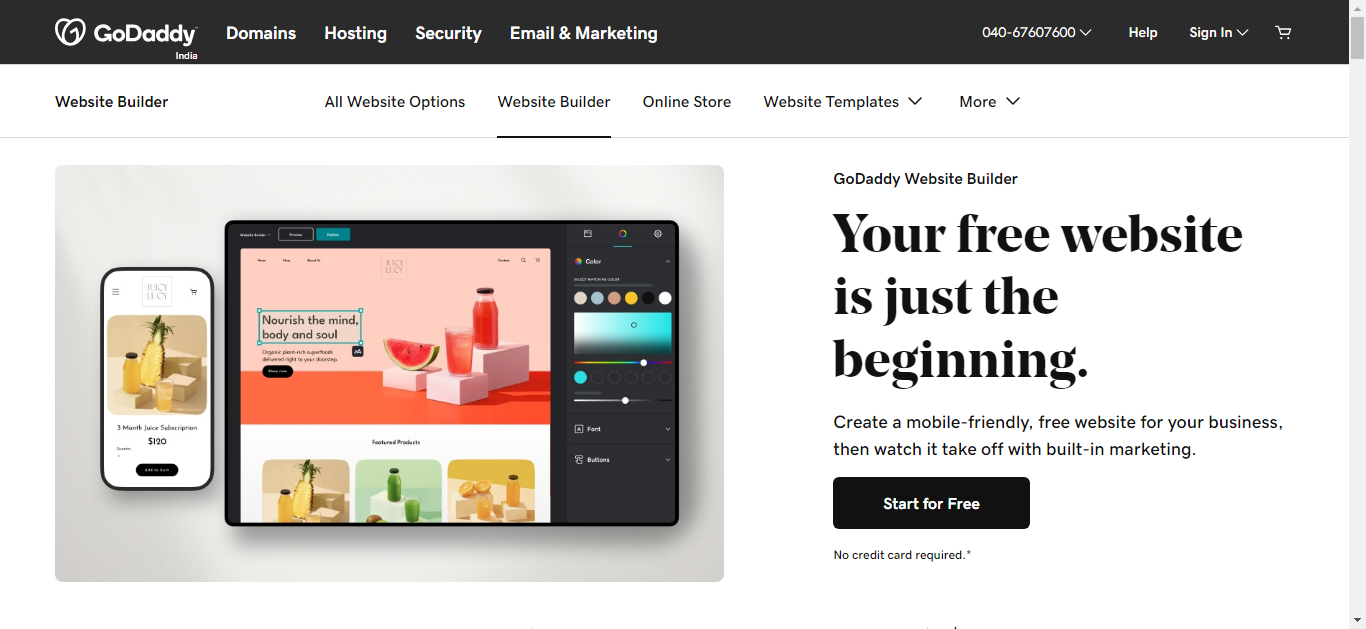
GoDaddy Website Builder is a website building platform offered by GoDaddy, a well-known domain registration and web hosting company. It’s designed to help individuals and small businesses create websites quickly and easily.
Here’s an overview of GoDaddy Website Builder’s key features and benefits:
- Ease of Use: GoDaddy Website Builder is known for its user-friendly interface, making it suitable for beginners and those without technical skills.
- Template Selection: The platform offers a variety of pre-designed templates that cover different industries and styles. You can choose a template as a starting point and customize it to fit your brand.
- Customization: While customization options might be more limited compared to some other platforms, you can adjust colors, fonts, images, and other elements to personalize your website.
- Mobile Responsiveness: All GoDaddy Website Builder templates are designed to be mobile-responsive, ensuring that your website looks good on various devices.
- Drag-and-Drop Editor: GoDaddy Website Builder features a drag-and-drop editor that allows you to add and arrange elements on your site easily.
- E-Commerce: The platform includes e-commerce capabilities, making it possible to create online stores and sell products. You can manage products, process payments, and handle orders.
- SEO Tools: GoDaddy Website Builder offers basic SEO tools, allowing you to optimize your site’s meta tags, descriptions, and headings for better search engine visibility.
- Blogging: You can create and manage blog posts using the built-in blogging features. This can help you share valuable content and engage with your audience.
- Domain and Hosting: GoDaddy Website Builder provides both domain registration and hosting, simplifying the process of setting up your website.
- Support: GoDaddy offers customer support through phone, live chat, email, and a knowledge base.
- Integrated Marketing Tools: The platform provides integrated marketing tools, including email marketing, social media integration, and analytics.
- SSL Security: GoDaddy Website Builder includes SSL security for your website, which helps protect customer data and boosts your site’s credibility.
- Online Appointments: Some plans offer the option to integrate online appointment booking and scheduling tools for businesses that offer services.
- Pricing: GoDaddy Website Builder offers different pricing plans, including a free trial. Plans cater to various needs, from basic websites to more advanced e-commerce stores.
GoDaddy Website Builder is a suitable choice if you’re looking for a hassle-free way to build a simple website or online store. It’s ideal for individuals and small businesses that value ease of use and want a platform that integrates domain registration, hosting, and website creation in one place. However, if you’re looking for extensive customization options or if you anticipate needing more advanced features as your website grows, you might want to explore other website builders with broader capabilities.
11. Duda
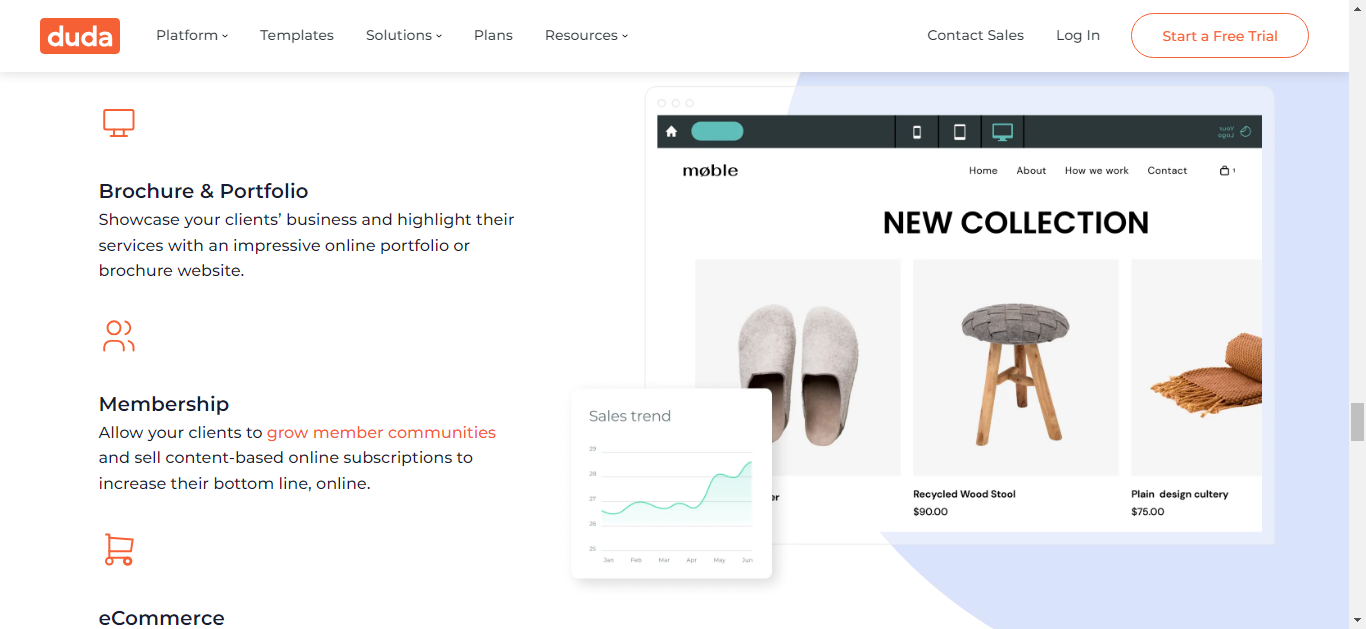
Duda is a website builder that focuses on responsive web design and offers tools for creating websites that look great on various devices, from desktop computers to smartphones. It’s particularly geared towards agencies, designers, and businesses that want to offer website building services to clients.
Here’s an overview of Duda’s key features and benefits:
- Responsive Design: Duda places a strong emphasis on responsive web design, ensuring that your websites automatically adapt to different screen sizes and devices.
- Drag-and-Drop Editor: Duda provides a drag-and-drop editor that allows you to create and customize websites without needing to know how to code.
- Widgets and Modules: Duda offers a variety of pre-designed widgets and modules that you can add to your website, including forms, galleries, maps, and more.
- Team Collaboration: Duda includes features for team collaboration, making it suitable for agencies and teams working together on website projects.
- White-Label Options: Duda offers white-label solutions that allow agencies and designers to brand the platform as their own when offering website building services to clients.
- E-Commerce: Duda provides e-commerce capabilities, enabling you to create and manage online stores. You can set up products, process payments, and handle orders.
- Template Customization: While Duda offers pre-designed templates, you have the flexibility to customize them extensively to match your brand and design preferences.
- Multi-Language Websites: Duda allows you to create websites in multiple languages, making it suitable for businesses with an international audience.
- Mobile Editing: Duda offers a unique feature that allows you to edit the mobile version of your site separately, giving you precise control over how it appears on mobile devices.
- SEO Tools: Duda provides basic SEO tools that allow you to optimize your site’s meta tags, descriptions, and headings for better search engine visibility.
- Analytics and Reporting: Duda includes analytics and reporting features that provide insights into your site’s performance and visitor behavior.
- Customer Support: Duda offers customer support through email, live chat, and phone. Priority support is available on higher-tier plans.
- Pricing: Duda offers different pricing plans, including plans tailored to agencies and businesses. There’s also a free trial to explore the platform’s features.
Duda is a good choice if you’re a designer, agency, or business looking to create responsive websites that provide a consistent user experience across different devices. It’s particularly well-suited for those who want to offer website building services to clients and value the ability to white-label the platform. While Duda offers features that cater to various needs, keep in mind that its focus on responsive design might make it especially appealing for projects where mobile-friendliness is a priority.
FAQs:)
A. Some website builders offer free plans with limited features, while others have premium plans with more advanced features. It’s important to compare the pricing and features to determine the best fit for your needs.
A. Website builders are ideal for those who want to create websites quickly and easily without learning how to code. They offer a range of templates and customization options to suit different types of websites.
A. Some popular website builders include Wix, Squarespace, Weebly, WordPress, Shopify, and Webflow, among others. The “best” one depends on your specific needs and preferences.
A. Consider your website’s purpose, design preferences, technical skills, and budget. Review the features, templates, and ease of use offered by different builders to find the one that aligns with your goals.
A. Yes, most website builders allow you to connect your existing domain or register a new one through their platform.
Read also:)
- What is a Website Design Portfolio: A-to-Z Guide for Beginners!
- How to Rank Website on Google: A-to-Z Guide for Beginners!
- How to Increase Traffic on Website: A-to-Z Guide for Beginners!
So hope you liked this article on 10+ Best Website Builder Reddit According. And if you still have any questions or suggestions related to this, then you can tell us in the comment box below. And thank you so much for reading this article.